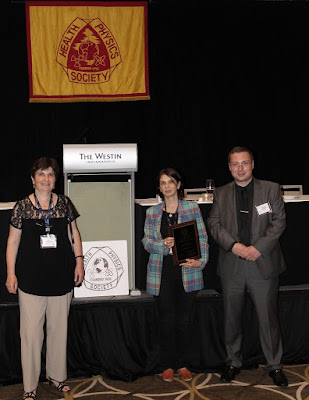 |
| Lia Chelidze (left) and Barbara Hamrick (right) |
by George Tabatadze 08-11-2015 for "HP news"
In January 2015, the HPS International Collaboration Committee (ICC) held the phone conference during which ICC members discussed the upcoming HPS 60th annual meeting activities, including plans for the ICC special session. It was particularly challenging to compile a list of international speakers. I immediately saw an opportunity for Dr. Chelidze, president-elect of the Georgian Health Physics Association (GHPA), to speak about current issues with radiation safety in Georgia.
Fortunately, my initiative was fully supported by the committee. At the same time, Dr. Chelidze was awarded 2015 G. William Morgan lectureship. Therefore, she was privileged to present two topics: “Legacy of Radioactive Waste Management in Georgia: Trends and Current Situation” at the ICC special session and “Future of the Medical Health Physics Profession in Georgia” during the plenary session. |
| Lia Chelidze (left) and Darrell Fisher (right) |
Dr. Chelidze presented a very detailed outline of all challenges Georgia has been facing in many areas of the radiation protection field, including orphan sources, waste management, and medical radiation safety. These problems, among many other factors, historically induced by ineffective radiation safety practices, were aggravated by lack of the radiation protection experts in Georgia; radiation safety duties were performed by professionals from various science disciplines such as physics, chemistry, and biology. These people were experts in their own field but had insufficient interdisciplinary experience that is essential for the modern-day health physicist. Additionally, radiation safety regulations were inadequate and in many cases – non-existent. Luckily, main radiation safety activities during the past two decades were supported by international organizations and partner government agencies: IAEA, European Union, U.S. Department of Energy Department of Defense, Department of State, and Health Physics Society – to mention a few. Although radiation protection activities were performed with an adequate oversight from international observers, necessity for a long term solution aimed at sustainability of the field was obvious.
The first step towards recognition of our profession was made in early 2000s, when a few Georgian students at the Idaho State University health physics program helped establishing the GHPA to promote the health physics profession and radiation safety culture in Georgia. It would not be possible without the support from Roy Dunker (ISU), and an initial inspiration received from HPS president Brian Dodd who suggested forming a society and popularizing the HP profession in Georgia. In 2007, GHPA was officially recognized as Georgian Chapter of the Health Physics Society.
A decade later, GHPA is acknowledged with ever influential membership in Georgia. Two HPS presidents Darrel Fisher and Barbara Hamrick visited the Georgian chapter during past years, supporting and strengthening ties between the two organizations. The same time, “Health Physics” as both profession and practice has also taken root in Georgia. Currently, Georgian government aims to reformulate all nuclear and radiation safety laws under one roof. “A one-stop-shop for all radiation safety regulations - a dream for all of us in the US may become a reality in Georgia!” – Roy Dunker shouted joyfully when he first learned about the initiative. The realization that formal training and standards of practice need to be established and reinforced by law has finally arrived. Concurrently, the Georgian Academy of Science Radiation Safety and Health Physics Committee has identified the urgent need for programs designed to build and maintain competencies of radiation safety professionals and, as an immediate objective, proposed to the Ministry of Education to formally implement education curricula, training objectives and certification for medical radiation safety professionals in Georgia. There is no mistake made by emphasizing medical radiation safety – this field is the primary user of radioactive sources and radiation producing machines in the country. Medical facilities are also the largest generators of the radioactive waste. The Academy also recognized Health Physics as a profession. These recommendations translated into efforts to establish the Health/Medical Physics program in Tbilisi State University (TSU), with input and cooperation from TSU Medical School and Georgian Academy of Science Research Institute of Clinical Medicine among others.
 |
| Maia Avtandilashvili (left), Lia Chelidze (center), and George Tabatadze (right) |
GHPA has come a long way since conception and with greater and continued support from HPS and its membership so will the health physics profession in Georgia. Today, with initiation of the health physics program in TSU, you are looking at the blank canvas and possibilities are only limited by your imagination. I am asking all of you to share your experience with Georgian colleagues to build a successful HP program in this country. If you are inspired by the story and decide to act on it with ideas, suggestions, or any other type of support (for instance, health physics book donations), please do not hesitate to contact GHPA. Finally, I hope that one day we all gather for our HPS annual conference in Georgia.

No comments:
Post a Comment